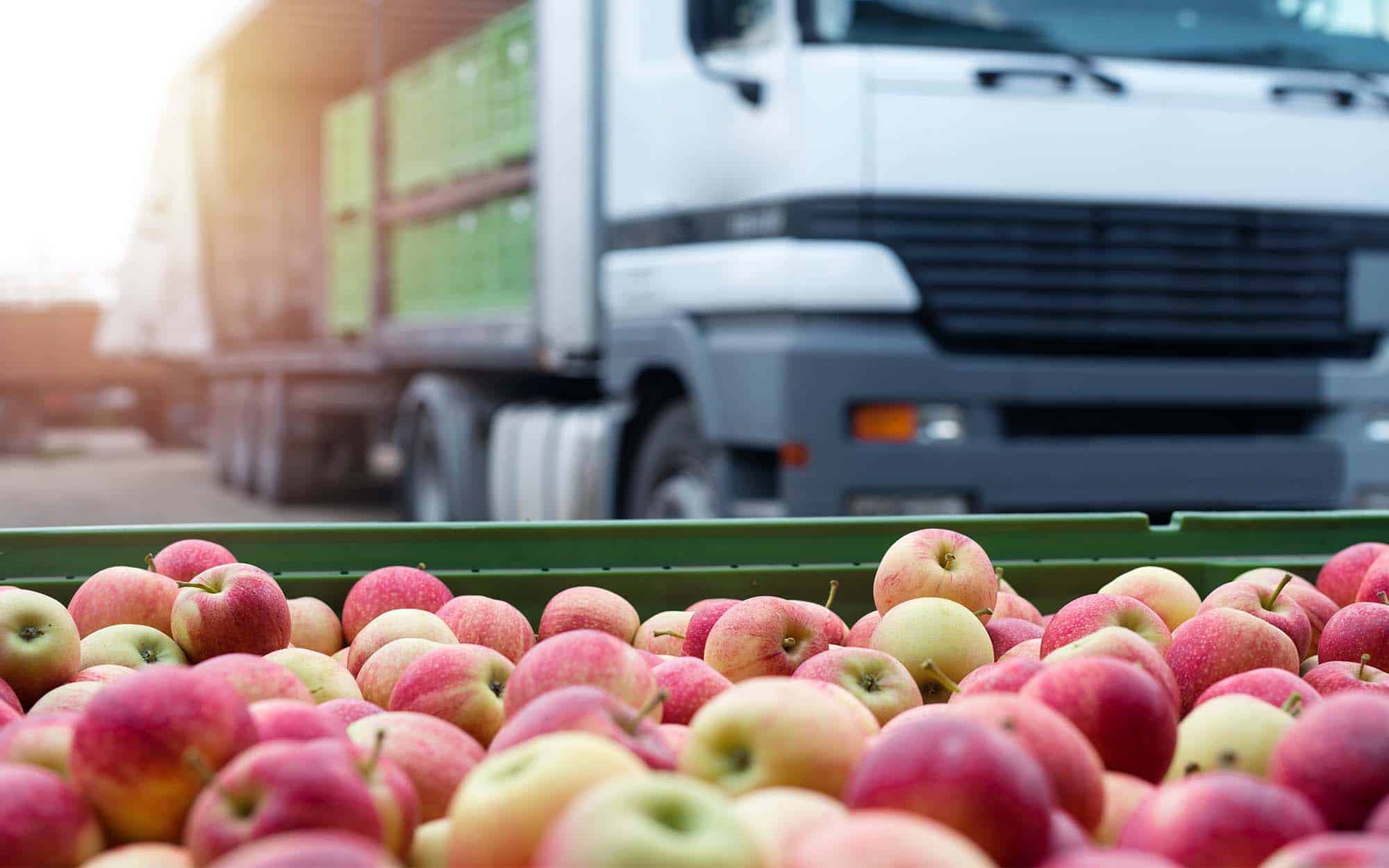3PL for Food: Ensuring Food Safety in Warehousing and Distribution
byNick Fryer/January 20, 2026/in3PL

Nick Fryer Vice President, Marketing

Third-party logistics (3PL) providers offer essential services to support the safe transportation, warehousing, inventory management and optimization, and order fulfillment of food products, from raw materials to finished products. Effective cold chain management ensures that perishable food items are maintained within temperature ranges that retain the freshness, quality, and safety of food products. Sheer Logistics provides both 3PL services and fourth-party logistics (4PL) solutions for a number of producers in the food and beverage industry, ranging from pet foods to deli meats and ready-to-drink bottled coffee to plant protein shakes. In this blog, I will explore the cold chain logistics industry; describe food safety standards in 3PL warehousing; explain the concept of “food grade” materials and transportation; address the importance of food safety for the warehousing and distribution of fresh foods; discuss the differences between various modes of refrigerated trucking and other transportation; and share criteria for selecting a 3PL partner that specializes in cold chain logistics.
Perhaps the key difference between cold chains and normal supply chains is timing. While standard shipments should avoid delays, the perishable nature of cold products means that any delay is potentially fatal to the quality of the product. This makes the process as important to a successful cold chain as the equipment and technology used. Shipments that are left unrefrigerated for even a few hours can mean lost revenue and products that are potentially dangerous to consumers. Food companies ranging from food service distributors to ecommerce need to determine several factors about the unique logistics needs of each product they sell before establishing a cold supply chain or engaging with cold storage providers:
Cold chain logistics is one of the most complex processes a company can undertake, which is why most turn to outsourcing as the answer to getting temperature-sensitive products where they need to go quickly and safely. Even companies that boast a robust supply chain system for ordinary goods often hire a third party logistics provider to design and implement the cold chain logistics they need to deliver their products quickly, safely, and without disruptions.
Temperature and climate control are critical factors in storing and delivering safe food products. “Temperature control” is a general term that describes a very specific range of temperatures at which certain products must be kept. Storage and distribution use very specific methods to keep products within safe ranges:
Food safety is critical in the transportation and warehousing of food products due to the risk of contamination and spoilage. Adhering to food safety standards such as the FDA’s Food Safety Modernization Act (FSMA) and implementing systems like Hazard Analysis Critical Control Points (HACCP) ensures that food products are handled, stored, and transported in compliance with health and safety regulations. Proper temperature control, cleanliness, and traceability are vital to maintaining food integrity, preventing foodborne illnesses, and ensuring consumer safety.
By ensuring compliance with stringent food industry safety standards, logistics services providers play a vital role in protecting public health and maintaining the reputation of food brands.
When something is considered “food grade,” it has to meet two important criteria:
The purpose of making the distinction is to prevent exposing a consumer to potentially dangerous health hazards. Food-grade shipping is important for shipping all foods, not just frozen or fresh food, and it doesn’t take a lot for a trailer that is designated for food shipping to fail an inspection. Shippers require high standards, and it is very important for logistics companies and carriers to pay attention to how food is shipped.
Cleanliness – Food can’t be shipped in dirty containers, even if they are packaged and boxed. Trailers that were used for other materials need to meet certain standards in order to transport food products.
Moisture – Any moisture in a shipping container can degrade the packaging and even contaminate the products stored within.
Dedicated Space – For a shipping container to be considered “food grade,” it must be solely dedicated to food shipment. The container needs to be completely empty of other products that could contaminate the food product. Better yet, the container needs to be completely dedicated to shipping a specific product.
Odor-free – Odors are another environmental threat to the quality of food-grade shipping. Unusual odors can permeate packaging and contaminate food products.
Secure – All shipments should be secure from people, but food-grade shipments have another threat—animals. A single hole in a trailer can let in raccoons, opossums, and other critters that can quickly destroy a shipment.
Trailer maintenance – Speaking of holes, safe temperature-controlled shipping is predicated on the ability to maintain a constant temperature at all times. Modern shipping technology allows shippers to know the status of their shipment at all times, but this doesn’t protect the shipment from dangerous conditions.
There are many critical aspects to maintaining food safety throughout the food supply chain that shippers, 3PLs and 4PLs must adhere to:
Compliance with U.S. regulations, such as FSMA and HACCP, as well as international standards, such as the Global Food Safety Initiative (GFSI), Safe Quality food (SQF), and the British Retail Consortium (BRC) are critical for maintaining food safety, protecting consumers, and maintaining brand reputation. Failure to comply with these standards can result in significant fines, legal action, and loss of customer loyalty.
Cold chain 3PL warehouses are purpose-built for the safe storage and handling of perishable food products. In addition to cooling and refrigeration systems, everything from the layout of the facility to the ventilation, lighting, and drainage systems are designed specifically to minimize the risk of cross-contamination and maintain hygiene and safety standards. Warehouse employees receive regular training to ensure proper handling techniques and cleaning procedures are strictly followed, and processes and procedures are routinely audited and certified by third parties to ensure compliance with established food safety benchmarks.
Similarly, cold chain transportation for perishable food products is a highly specialized service. 3PLs that specialize in cold chain transportation utilize refrigerated trucks, known as “reefers”, to transport full truckloads of food products. Refrigerated less-than-truckload (LTL) and Sprinter vans are utilized for smaller shipments. Temperature-controlled air freight and shipping containers are used for longer-distance and international shipments.
3PLs that specialize in warehousing and distributing food products maintain accurate and thorough record-keeping and documentation of shipments and storage conditions. These records are critical in the event of food recalls or when tracing the source of suspected contamination.
When you’re ready to select a 3PL cold chain partner, here are some key capabilities to consider:
Selecting the right 3PL partner for food warehousing and distribution is essential to maintaining the safety, quality, and freshness of your products. Cold chain logistics plays a pivotal role in ensuring that perishable goods are transported and stored within the appropriate temperature ranges, safeguarding against spoilage and contamination. By choosing a 3PL provider with strong expertise in temperature control, regulatory compliance, and advanced technology, food manufacturers and distributors can establish a reliable and efficient supply chain that meets both industry standards and customer expectations. To learn more about how Sheer Logistics can support your cold chain objectives with 3PL, 4PL, or consulting services, please contact us today.

 Supply Chain Disruption: Strategies to Manage and Prevent Future Crises
Supply Chain Disruption: Strategies to Manage and Prevent Future Crises